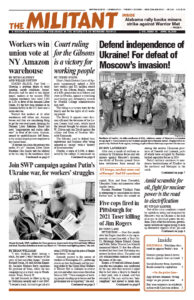At demonstrations against Moscow’s assault on Ukraine, fellow protesters agree with the demands raised by the Socialist Workers Party to defend Ukraine’s independence and for the defeat of Moscow’s invasion. But many question the party’s opposition to Washington imposing far-reaching economic sanctions on Russia, and its demand for U.S. troops, weapons and nuclear arms out of Europe.
The party explains it’s only the working people of Ukraine and Russia, in their class solidarity, who have the power to defeat Moscow’s war. Sanctions get in the way of furthering this course. They hit working people in Russia the hardest and play into the hands of President Vladimir Putin, who claims he’s defending the “homeland” against a foreign assault on its people.
While the SWP supports Ukraine’s right to get arms from wherever it can, the party opposes the arms race underway by capitalist rulers in Washington, Europe and Asia. All these regimes shed crocodile tears over Ukraine’s national sovereignty, but their real concern is to protect the profits and strategic political interests of their capitalist rulers.
Capitalism works by fierce competition over markets and resources, necessary along with human labor for profits. The entire history of the imperialist epoch is the way this system has expanded its exploitative tentacles into every corner of the globe. This was what World Wars I and II were all about, and will, inexorably, lead to World War III unless working people can organize to prevent it.
Today’s capitalist economic crisis, exacerbated by the sanctions, has meant prices for basic goods are skyrocketing in Russia and working people face shortages and steep declines in their living standards. In the city of Kurgan, in a southern region, for example, the price of onions has gone up 160%. Compared with March last year in Russia cabbage is up 209%, sugar 56%, fruits and vegetables more than 20%, meat and poultry close to 20%. One in four Russians say they now have to scrimp to make ends meet.
Since the invasion almost 500 international companies have closed or suspended operations in Russia, resulting in shortages, rising prices and increasing layoffs. “In early March,” wrote the Wall Street Journal, “car maker AvtoVAZ halted production of its Lada automobiles, placing thousands of workers on leave. Such a stoppage was once unthinkable.”
Thousands of people have taken to the streets in dozens of cities throughout Russia to protest Moscow’s assault on Ukraine, with more than 15,000 having been arrested so far. For opponents of Putin’s war worldwide, seeking a road to cut through his regime’s lies and repression and help win Russian working people to join in defending Ukraine’s right to its sovereignty is crucial. This includes reaching out to win over Russian troops, most of whose conscripts are workers, farmers or members of Russia’s oppressed nationalities in uniform.
But the effects of the sanctions make this qualitatively more difficult. “Shaken at First, Many Russians Now Rally Behind Putin’s Invasion,” headlined an April 1 New York Times article. “Opponents are leaving the country or keeping quiet,” the paper said, but “many Russians now accept the Kremlin’s assertion that their country is under siege from the West.
“Particularly effective,” said the Times, is “the steady drumbeat of Western sanctions, with airspace closures, visa restrictions and the departure of popular companies like McDonald’s and Ikea.” This allows workers and some middle-class layers to extend grudging support to Putin’s efforts to rally patriotic acquiescence to the slaughter.
At the same time, the Times admits, the support Putin has won is shallow, not enthusiastic.
The capitalist Zelensky government in Kyiv also helps Putin when it bans opposition political parties — parties that oppose Moscow’s invasion — and passes new restrictions on the unions in the name of national unity.
Threat of World War III
Washington and its imperialist allies argue that sanctions are an effective way to punish Moscow without getting involved in an escalating military conflict in Ukraine. But sanctions, like the sweeping measures being imposed on Russia, are in fact economic warfare. History shows they can easily lead to wider war.
In 1940-41, as World War II began in Europe, President Franklin Roosevelt placed far-reaching economic sanctions on Japan, culminating in an oil embargo that deprived Tokyo of a key resource it had none of at home. In response, Japan’s imperial rulers decided they had no choice but to open a war with Washington and bombed Pearl Harbor. The Nazi government in Berlin joined in declaring war on Washington.
While all political questions are at root class questions under capitalism, none is more so than the question of war. What is decisive in defeating Putin today and future designs on Ukraine is uniting working people in Ukraine, Russia and beyond together to this end.

